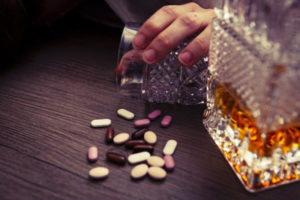The medication guide for Flexeril, published by the U.S. Food and Drug Administration (FDA), warns that the combination of alcohol and the medication can lead to mental and physical impairment.
Mixing Flexeril with alcohol can have risky and potentially life-threatening side effects.
Flexeril
Flexeril is a brand-name prescription medication of cyclobenzaprine that is dispensed to regulate muscle spasms. It is used as a short-term muscle relaxant for people struggling with acute and painful musculoskeletal conditions.
It is not a controlled substance, but the U.S. Drug Enforcement Administration (DEA) warns that cyclobenzaprine does have some potential for abuse as a recreational drug. It can cause relaxation and euphoria, and it may be mixed with other substances to increase its mind-altering effects.
Both Depressants
Both Flexeril and alcohol are central nervous system depressant substances, which means that they slow down life-sustaining actions like breathing and cardiovascular functions. Combining these two depressants can exacerbate the effects of each and more quickly lead to toxic overdose, drug dependence, and addiction.
Intoxication and Impact of Flexeril and Alcohol
The most common side effects of Flexeril are dizziness, dry mouth, and drowsiness. Additional reactions include mental impairment, mood swings, nausea, and stomach pain.
Central nervous system depressant substances slow down some of the nerve firings in the brain and the central nervous system, which can lead to relaxation and sedation. Heart rate, blood pressure, respiration, and body temperature are all lowered. Mental facilities are also impacted, and it can be harder to think clearly, remember things, or make good decisions.
Since alcohol is also a depressant substance, the combination of Flexeril and alcohol can increase the depressant effects of both substances. A person may get drunk faster, and smaller amounts of the medication can have more impact.
Signs of Alcohol and Flexeril Intoxication Are As Follows:
- Sluggishness
- Drowsiness
- Dizziness
- Slurred speech
- Blurred vision
- Loss of motor control and coordination
- Impaired thought processes
- Trouble concentrating
- Diminished reflexes
Decision-making abilities are impaired, impulse control is weakened, and inhibitions are lowered.
Someone under the influence of alcohol and Flexeril may be more apt to take bigger risks without thinking through consequences. This can lead to injury, accidents, or unsafe behaviors that can have lasting consequences, such as unplanned pregnancy or the contraction of a sexually transmitted disease.
Mixing alcohol and Flexeril increases the potential risk factors for both substances, both physically and behaviorally.
Risk for Overdose

The U.S. Centers for Disease Control and Prevention (CDC) warns that in the United States, about six people pass away from alcohol poisoning every day. Mixing alcohol with another central nervous system depressant drug like Flexeril can raise the risk for fatal overdose.
The DEA publishes that in 2010, there were over 10,000 exposure calls to the American Association of Poison Control Centers mentioning cyclobenzaprine. More than half of these involved another substance as well.
It may be difficult to know how much Flexeril or alcohol will impact the system when mixing it with another depressant. The effects may be rapid and unpredictable.
This is especially true if Flexeril is chewed or crushed, and the extended-release formulation is bypassed. Abuse of Flexeril greatly increases the potential risk for an overdose.
Mayo Clinic publishes the following signs of alcohol poisoning:
- Mental confusion
- Nausea and vomiting
- Slow and shallow breathing
- Seizures
- Low body temperature
- Bluish tinge to the skin, nails, and lips
- Sedation and loss of consciousness
A Flexeril overdose can also cause urinary retention, unbalanced heart rate, and high blood pressure, the journal Academic Life in Emergency Medicine (ALiEM) publishes.
Drinking alcohol while taking Flexeril can increase the odds for a potentially life-threatening overdose, which should be considered a medical emergency.
Long-Term Hazards of Mixing Alcohol With Flexeril
Alcohol is the most regularly consumed addictive substance in the U.S., the National Council on Alcoholism and Drug Dependence (NCADD) publishes.
Psychoactive substances like alcohol and Flexeril make changes to brain chemistry when they enter the system. These changes result in modifications to the reward pathways in the brain and to the way a person feels pleasure. With repeated chemical interaction, it can become difficult to feel pleasure without the substance, and physical dependence sets in.
Physical dependence comes with difficult withdrawal symptoms when the substances are not present in the bloodstream. In the case of alcohol, withdrawal can actually be life-threatening if delirium tremens (DTs) occur.
Mixing another depressant substance like Flexeril with alcohol can regularly increase the rate of physical dependence, lead to dependence more quickly, and exacerbate and complicate withdrawal symptoms.
Potential For Addiction
Long-term use of Flexeril with alcohol can elevate the risk of addiction.
Addiction has physical ramifications and symptoms, which can include physical dependence, tolerance (needing to take more to feel the same effects), and withdrawal symptoms, as well as behavioral and emotional aspects.
When someone struggles with addiction, many areas of life are impacted as thoughts of obtaining and using the substances can become all-encompassing. Addiction is compulsive. It is a chronic brain disease that is best managed through comprehensive treatment methods.
When Flexeril and alcohol are regularly combined, the risk for addiction is higher than if just one substance is used on its own. Complications can also be amplified.
Medical detox is often helpful first to allow the substances to process out of the body safely. A complete treatment program following detox can aid in managing addiction and supporting long-term recovery.

